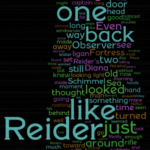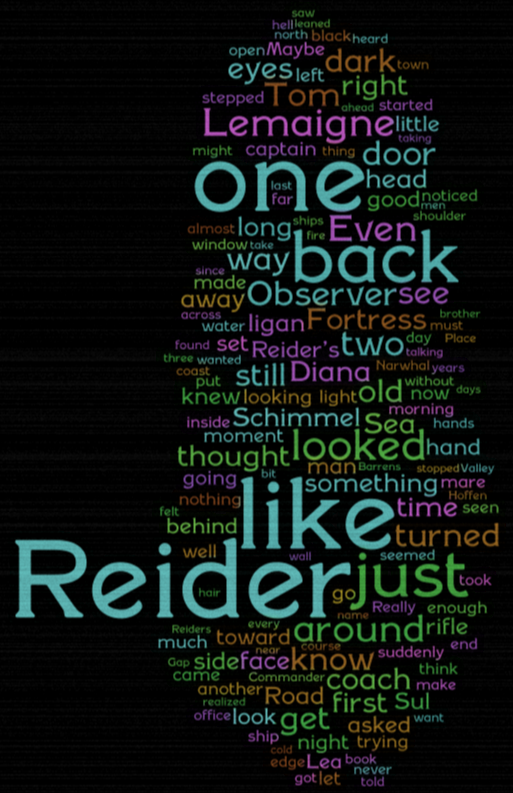
 I realize this is not going to be a popular sentiment on the eve of National Novel Writing Month, but I find the entire enterprise misguided and detrimental to both the art and business of fiction writing.
I realize this is not going to be a popular sentiment on the eve of National Novel Writing Month, but I find the entire enterprise misguided and detrimental to both the art and business of fiction writing.

 I realize this is not going to be a popular sentiment on the eve of National Novel Writing Month, but I find the entire enterprise misguided and detrimental to both the art and business of fiction writing.
I realize this is not going to be a popular sentiment on the eve of National Novel Writing Month, but I find the entire enterprise misguided and detrimental to both the art and business of fiction writing.
 jackass A kind of heavy rough boat used in NEWFOUNDLAND. Also, U.S. Navy name for a HAWSE-bag, a canvas bag filled with OAKUM used to plug the HAWSE-HOLES to keep seawater out.
jackass A kind of heavy rough boat used in NEWFOUNDLAND. Also, U.S. Navy name for a HAWSE-bag, a canvas bag filled with OAKUM used to plug the HAWSE-HOLES to keep seawater out.
jackass rig Any rig of a sailing ship that substantially differs from the one normally associated with that type of ship.
– A Sea of Words : A Lexicon and Companion for Patrick O’Brian’s Seafaring Tales by Dean King with John B. Hattendorf and J. Worth Estes.

 First, check out the Guardian’s piece on Philip Roth’s prediction that novel-reading will become a “cult” phenomenon within a quarter century.
First, check out the Guardian’s piece on Philip Roth’s prediction that novel-reading will become a “cult” phenomenon within a quarter century.
Now, let me tell you why I disagree. And, I’ll try to avoid resorting to wishful thinking, personal anecdotes, and ad hominem references to Roth’s literary pattern of heroically gilding the past (specifically the 30s and 40s) even as he cynically (and ironically/hypocritically?) critiques optimistic American principles as mere camouflage for socio-political evils.
First, here is Roth’s basic premise:
To read a novel requires a certain amount of concentration, focus, devotion to the reading. If you read a novel in more than two weeks you don’t read the novel really.
I’ll grant him that reading certain novels which — at 160+ thousand words and lots of text that advance* neither plot nor symbolic theme — drag out to the length of what could be two or three more concise and coherent books, might prove a test of optical-mental discipline.
But, to claim that taking a long time to finish a novel somehow demonstrates a lack of discipline seems absurd. Reading a novel during a week off is easy. Reading a novel over three or more weeks implies that something is going on that threatens the reading process, and the reader is fighting to read.
That’s dedication.
It may not bode well for the publishing industry, given the implied rate of purchase, but to maintain connection to a book over a longer period of time indicates that the reader is returning to the novel in spite of other activities in his or her life (9-to-5 job, kids, relationship drama, sick friends, car trouble, political activity, etc.) that distract from reading.
It also implies that Roth hasn’t really thought his theory through, in light of the way that the lives of real people work. His theory wraps up thusly:
The book can’t compete with the screen. It couldn’t compete [in the] beginning with the movie screen. It couldn’t compete with the television screen, and it can’t compete with the computer screen … Now we have all those screens, so against all those screens a book couldn’t measure up.
This indicates that Roth (who, as I promised not to mention, idolizes the past) doesn’t really grasp modern technology. Firstly, books actually did compete with the movie screen; publishing didn’t die after the introduction of movin’ pitchers. Secondly, books also competed well with the television screen.
In fact, books exploited and benefited from those two screens. If you don’t believe me, stack up a DVD collection of every season of every version of Star Trek, plus every Star Trek movie. Next to it, stack up every Star Trek novel ever sold that made returns on investment.
Now, lease some storage space in which to store that mountain of paperbacks.
Does that count as a Thirdly? If not: Thirdly, Roth is creating a false sense of written fiction being outnumbered by film and television and the web, by drawing too bright a line between these “screens.” Particularly in the Internet Age, the idea that television, cinema, and computers are separate “screens” is tragically lacking in vision and rational insight.
Just ask Hulu.com.
I first watched Planet of the Apes (the original, without Heston’s ironic gun-control message) on the small screen. I preferred the Fugitive movie to the TV show. Some readers have commented that my scenes are paced more like scenes in a movie than in a conventional novel, and I have to admit that I think a lot about visual framing when I describe imagery: panning, zooms, cuts…
A more apt image than Roth’s multiple warring screens, I think, would be multiple facets of the same gem reflecting and refracting into each other, the gem being creative fiction. The new e-readers will certainly change the shape of that gem, forcing new business models, but the idea that people will simply abandon novel-reading is as short-sighted as the perennial hand-wringing about films that run too long.
Movies that keep the viewers’ interest for over 90 minutes will outdo shorter stinkers at the box office every time. Likewise, the survival of the novel has less to do with how long they are and more to do with how interesting they are.
_
* Lots [of text] advance. Beat you to it.
 o’spray. The sea-eagle, of which it is reported, that when he hovers in the air, all the fish in the water turn up their bellies, and lie still for him to seize which he pleases.
o’spray. The sea-eagle, of which it is reported, that when he hovers in the air, all the fish in the water turn up their bellies, and lie still for him to seize which he pleases.
– Johnson’s Dictionary : A Modern Selection by Samuel Johnson (1755), ed. E. L. McAdam and George Milne (1963)

 An excellent survey of recent shifts in the publishing industry by Nathan Bransford raises the question: has “everything in publishing changed all at once … or was it more of the same?”
An excellent survey of recent shifts in the publishing industry by Nathan Bransford raises the question: has “everything in publishing changed all at once … or was it more of the same?”
Of course, if the publishing industry is about to price-war itself out of business, the timing would be perfect as I prepare my second round of query letters…

Having just dumped an impromptu mess into Nathan Bransford’s first paragraph contest, I was a bit humbled and very impressed to see this fantastic introduction by Mandy Morgan on her livejournal site. Her insertion of a mysterious phenomenon into an otherwise familiar setting is quite well-done.

Below is a word cloud for the entire text of The Ligan of the Disomus, courtesy of wordle.net and a little PhotoShop.


 A very interesting piece in Pittsburgh’s Post-Gazette marks the 30th anniversary of African American programming at Colonial Williamsburg by delving into the cousine of enslaved blacks, a combination of European foods, African techniques, and American ingredients.
A very interesting piece in Pittsburgh’s Post-Gazette marks the 30th anniversary of African American programming at Colonial Williamsburg by delving into the cousine of enslaved blacks, a combination of European foods, African techniques, and American ingredients.
The rough conditions and harsh schedules in which the slaves had to prepare food are striking, made all the more so by the technological gulf separating even the best-equipped kitchen of the 1700s from the electronic luxuries of 2009.
On 13 October 1775, the Continental Congress ordered the creation of the the Continental Navy, which would later become the United States Navy. In other words, the Navy is older than the Republic itself.
The first ship commissioned was the Alfred, formerly named the Black Prince, thus establishing a long tradition in the U.S. Navy of renaming things to sound sillier than they sounded before.
Ironically, during my ten years of naval service I never set foot on a ship. But, if you get a chance to tour a US Navy vessel (I have toured the still-active Yellowstone and the legendary Constellation) don’t pass it up. The tight and efficiently packed interior of a ship, particularly a sailing vessel, is an experience unlike anything you might find on land … although perhaps not recommended for the claustrophobic.
And, if you see a sailor today, wish him a Happy Navy Birthday.

 Beams believed to be from the water bastion of mid-18th Century Fort Edward have been dredged up, interestingly as part of clean-up effort aimed at removing dangerous pollutants from the bed of the Hudson River. Artifacts from the early encroachment of pre-Industrial civilization on the North American continent now have to be tested for industrial PCB’s just to determine whether they are safe for public viewing.
Beams believed to be from the water bastion of mid-18th Century Fort Edward have been dredged up, interestingly as part of clean-up effort aimed at removing dangerous pollutants from the bed of the Hudson River. Artifacts from the early encroachment of pre-Industrial civilization on the North American continent now have to be tested for industrial PCB’s just to determine whether they are safe for public viewing.
Fort Edward was the furthest navigable point inland on the Hudson, and therefore the beginning of “portage” or carrying goods and vessels overland from water to water. It is also known as the location where New Hampshire’s Major Roger Roberts wrote his famous Rules of Ranging.